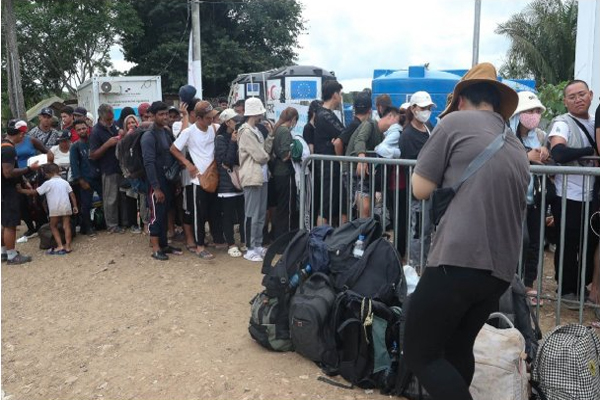
Costa Rica declared a “state of emergency,” yesterday, citing a wave of migrants from Venezuela, Haiti, Cuba and around the world moving through Costa Rica headed for the United States.
Since January, more than 386,000 migrants have passed through the border from Panama into Costa Rica. The flow has put a strain on Costa Rican communities and resources.
So far in September, more than 60,000 people have passed through the Costa Rican border town shared with Panama, Paso Canoas, where fewer than 20,000 people live, according to Costa Rican officials. (Reuters)
Authorities said the national emergency aims to enhance security measures at the border while still ensuring humane treatment and safe transit for migrants who will be redirected from Canoas and transported via buses to the country’s north, reports the Tico Times.
Costa Rican President Rodrigo Chaves will visit Panama in early October to hold discussions on the migrant crisis.
Earlier this week, the United Nations Office for International Migration said there was an “unprecedented” surge of migrants transiting through Central America and appealed for governments in the region to collaborate to meet humanitarian needs, reports the Miami Herald.
Costa Rica is reaching its breaking point according to Germany’s human rights commissioner, who visited this week. “There is still space and protection, but recently there has also been a debate about a more restrictive asylum policy.” (Deutsche Welle)

More Migration
- “The ongoing crisis in Venezuela, neighboring countries’ inability to cope with the continuously growing number of migrants, and confusion around US immigration policy are providing fertile ground for organized crime to continue to thrive along the Venezuela-US route,” reports InSight Crime.
More Costa Rica
- Homicides in Costa Rica have reached record highs, reports InSight Crime.
El Salvador
- More than a dozen confidential reports from El Salvador’s National Civil Police obtained by InSight Crime counter the Bukele administration’s triumphalist portrayal of a heavy handed gang crackdown. (See yesterday’s briefs.)
- Although “weakened” after a year and a half under a state of exception, the three main gangs operating in El Salvador remain a subtle threat, with 54 armed groups, mostly in rural areas. Nearly 43,000 people who have been profiled as gang members remain at large. (InSight Crime)
Brazil
- Brazil’s congressional agribusiness lobby managed to pass a bill to counter last week’s Supreme Court decision ruling that Indigenous land claims do not have a cutoff date. The bill passed yesterday fixes a 1988 deadline for land claims and could deepen a divide between a conservative-led Congress and the Supreme Court, reports Reuters. (See last Friday’s post.)
- “The court’s decision is consistent with precedent from the Inter-American Court of Human Rights, which has recognized the right of Indigenous peoples to their land and said that right continues as long as their “material, cultural, or spiritual connection” with the land persists,” notes Human Rights Watch.
- Amazonian communities are increasingly creating independent self-defense groups, taking on the role of protecting areas where the state is lacking. The Guardian reports on the Paiter Suruí community in Brazil’s Rondônia state, which established the country’s third Indigenous brigade to tackle blazes during the fire season.
- Brazil’s government is preparing a task force to provide emergency assistance to 111,000 inhabitants of the Amazon region affected by a severe drought. Low river levels and hotter waters have killed masses of fish, contaminating the drinking water. (Reuters)
- The Brasil Sem Fome (Brazil Without Hunger) plan, launched by the Lula administration in late August, is “arguably the most comprehensive set of anti-hunger policies the world has ever seen,” writes Elisabetta Recine, President of the Brazilian National Food and Nutrition Security Council, in Al Jazeera.
- “There is “no contradiction” between Brazil’s plans to step up oil and gas exploration, including in waters off the Amazon rainforest, and its aspiration to lead the world’s transition to green energy,” energy minister Alexandre Silveira told the Financial Times. “With nearly 90 per cent of its electricity generated from renewable sources, as well as a big biofuels programme, Brazil has the “political, economic and moral authority” to talk about a just and inclusive energy transition with rich nations.”
Colombia
- Thousands of Indigenous protesters, members of a collective movement dubbed Minga, have converged in Bogotá. They are protesting an ongoing wave of violence that has disproportionately affected Indigenous people in Colombia, their first demonstration during Gustavo Petro’s presidency, reports Al Jazeera.
- “Colombia should undergo a radical transformation,” Petro told the Washington Post in an interview.
Venezuela
- A Venezuelan security operative in the country’s Tocorón prison earlier this month found that the Tren de Aragua criminal gang had turned the penitentiary into a sort of “luxury resort,” complete with a small zoo and tunnels to enter and leave, reports the Washington Post. (See last Thursday’s briefs.)
- Though Venezuela’s government claims the operation “utterly dismantled” the powerful Tren de Aragua gang, the move “smacks of political theater as the gang’s leadership escaped and its operations remain largely untouched,” reports InSight Crime.
Regional Relations
- The U.S. Treasury has announced sanctions against nine affiliates of Mexico’s Sinaloa drug trafficking cartel, as well as the current leader of Colombia’s powerful Clan del Golfo criminal enterprise. (Associated Press)
- A historical illustration featuring a crown found in the British Library links the British monarchy to the slave trade, symbolizing the South Sea Company’s involvement in enslaving and branding people for sale in the Spanish West Indies under Queen Anne’s reign in 1715. It is among a number of new archival investigations “revealing that successive British monarchs played a more intimate role than previously recognized, reaping profits that continue to benefit British royals today,” reports the Washington Post.
Jordana Timerman / Latin America Daily Briefing
http://latinamericadailybriefing.blogspot












